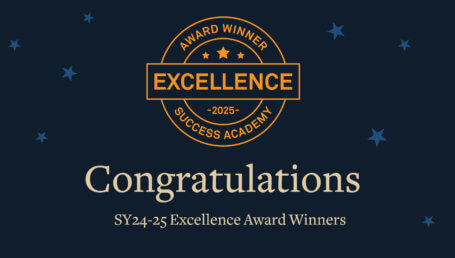
The application for the Curriculum Advisory Council was not easy — why did you apply?
I’m not going to lie — the application for the Council was intense. But I think it was intense on purpose: You don’t want just the average Joe when you’re talking about kids. I looked at the application and thought, “OK, they mean business.” And that was motivating. I didn’t want to join something that was just for show.
I became an educator for the sole purpose of giving kids who look like me the tools they need to get to and through college and to succeed in the world. So for me, applying to the Council came down to, “If I can kick down doors so that kids can just stroll through them — I’m down for it.” I wanted to be part of kicking down doors, and I believe that curriculum is one of the key ways to give kids access to the world.
What got you interested in curriculum?
I entered education through Teach for America and worked for three years as a middle school history teacher in a charter school in the South Ward of Newark. I did not have the experience of working with a great, inclusive curriculum. My first year, I was given a textbook and told to teach it. My kids didn’t relate to the content, I didn’t relate to the content. So a month into my first year teaching I took the curriculum to my direct manager and told her I was scrapping it. I met with colleagues, scoured the internet, and used all my vacation time to find great resources. And thanks to all this work, I was able to give them a curriculum that was rigorous and gave them access.
The impact of this effort was really visible when we went on a trip to Washington, D.C. at the end of the year. My students were just incredibly engaged and connected to what we were seeing. They knew all the monuments and their relevance. We went to the National Great Blacks in Wax Museum, and they knew so much they were even explaining things to the tour guide! And I thought, “OK. This is what a good curriculum can do. Good curriculum is access. Good curriculum lets you know who you are.”
What was your experience with curriculum as a K-12 student?
I went to public school in New York City, and when I went to college I experienced culture shock. All of a sudden I was being exposed to other worlds and to authors who looked like me. I had encountered none of that in my K-12 schools. So this experience really informs the work I am doing on the Council. I am always thinking, “How can we make sure our kids do not experience that kind of culture shock in college?”
What you are finding as you audit the SA curriculum?
I think SA has really tapped into something. They are giving kids that experience in Black, European, Indigenous, and Asian history. But there are opportunities. For example, there is room for improvement in the the fourth-grade Project-Based Learning unit on the American Revolution. Also, while the curriculum has the tools, it doesn’t necessarily have the lessons on how to use the tools.
What are some areas of the curriculum that have jumped out at you?
Middle school history is my jam, and I can say that one unit that motivated me and made me cheer is a 7th-grade Global History unit on Revolutions and Social Movements. The unit looks at the Haitian and French Revolutions and also brings in the Latin American revolutions. It digs into the who and the why and the people who were integral to the movements. And then it connects these revolutions to current-day social movements, bringing in documents from the present day. For example, they read the New York State “Eric Garner anti-chokehold act,” sponsored by NY State Senator Brian Benjamin. I can’t imagine being able to learn this kind of content as a middle schooler. I just love how it connects the dots from history to the present and helps kids understand where we’re coming from and where we are now.
What has the audit process been like?
We have used the high school history curriculum as a model because it was recently revamped to close the gaps they noticed that scholars were coming in with. We are using that model, but through a DE&I lens. One thing they realized in the high school revamping process was that teachers needed more content to teach effectively. So that is definitely something we are looking at.
Participating in the Council has made me feel like a student again — all the members have different perspectives so even as I’m seeking to change learning for kids, I’m learning myself. It’s a great experience.










